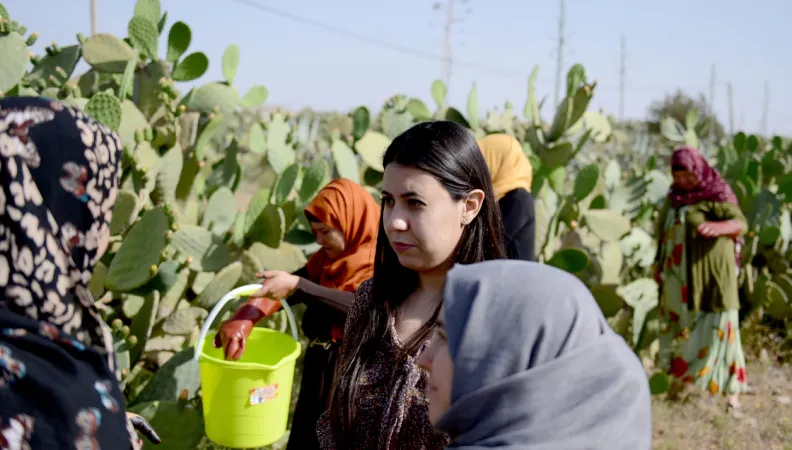Share the page
Civil Society, a Key Player in Managing the Health Crisis in Tunisia
Published on

Backed by AFD, Tunisian civil society has mobilized extensively to support the country's most fragile and marginalized communities. Below, an overview of the most successful initiatives, including the distribution of food and sanitary equipment, awareness-raising activities and support for public services.
In Tunisia, the numerous inequalities affecting the country's interior motivated the emergence in 2013 of an unprecedented Franco-Tunisian cooperation program, Soyons Actifs/Actives, the result of collaboration between associations, local authorities and public authorities in both countries.
As soon as the first cases of contamination were observed in Tunisia in early March, the AFD-supported program set up an emergency fund to support the many citizens’ initiatives of its 80 members. These associations, which are well established in their territories, were able to organize prevention and solidarity campaigns in conjunction with local administrative and health authorities and participate in coordinating the intervention of the different stakeholders.
From Bizerte to Tataouine, via Greater Tunis, Sidi Bouzid, Kasserine, Mahdia, Gabes, Sfax and Djerba, hundreds of volunteers accompanied by Soyons Actifs/Actives moved into action to meet emergency needs and help more than 10,000 isolated and precarious families.
Support and raise awareness
In Djerba, food products, masks, gloves, gel and hygiene and essential products were distributed to the most vulnerable families and to medical staff in the region's health establishments.
In Sfax, many associations also mobilized to ensure the continuity of public services, despite the crisis. “We helped disinfect post offices, police stations and other local administrations” said Nidhal Ben Amor, a volunteer with the cité El Habib scouts. “We also secured access to food by organizing food distributions and queues in front of the shops.” In another worthy initiative in Kasserine, the Jeunes Actifs association produced a comic book to raise awareness of the current crisis among children in the region in a playful way.
In the neighboring governorate of Sidi Bouzid, the Victoire pour la femme rurale association, which has been working for many years with female agricultural workers in the region, decided to organize awareness-raising activities for these workers in the informal sector and to provide them with protective masks and cleaning products so that they could continue to work and earn a living.
Finally, in Ras Jebel, the association of unemployed graduates, ‘Creation, Creativity for Development and Employment’ (CCDE), which develops social and solidarity economy projects, mobilized to build a temporary hospital in record time. “Even though the public health sector has been neglected in recent years, we are proving that it is still possible to act” said Hamadi Jeljeli, its president.
“Our economic model must now turn more towards the social and human aspects, which is why we have pleaded with the Tunisian government and members of parliament for the urgent drafting of a law on the social and solidarity economy, which recognizes and supports these players. Thousands of workers in precarious employment will be without jobs tomorrow, let's give them a chance to take part in projects that are useful and sustainable for our territories”.
Preparing for the post-Covid era
Within the Actifs/Actives program, thoughts are already focused on the post-Covid era. The last steering committee meeting defined three new strategic priorities that will be deployed in the coming months:
- Supporting the development of popular education school clubs during the end-of-year exams and at the start of the next school year in September so that the children can share their emotions, help each other to succeed in school and develop mini-projects to act on the world of tomorrow (school gardens, film clubs, etc.)
- Supporting social and solidarity economy projects aimed at communities that the health crisis has made economically vulnerable
- Mobilizing to ensure that citizen participation and the social worth of associations are included in all local and national public policies
“This unprecedented crisis reminds us once again that we are living in an era of globalization which aims at interdependence without solidarity, says Lassaad Arfaoui, program director in Tunis. As a result, we owe it to ourselves, as civil society stakeholders on both sides of the Mediterranean and far beyond, to join together to preserve the rights of the most disadvantaged people and to reflect together on systems of solidarity within and between the countries”.
